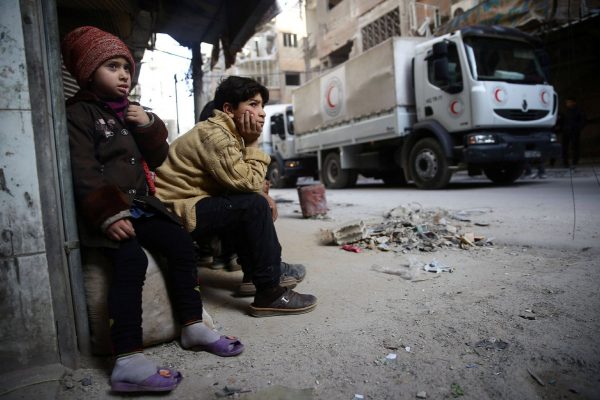
After multiple attempts in recent weeks to gain humanitarian access to Eastern Ghouta, the International Committee of the Red Cross said on Monday that it finally reached the war-ravaged eastern suburbs of Damascus earlier in the day.
The ICRC was part of a joint aid convoy with the Syrian Arab Red Crescent and the United Nations in a 46-truck convoy that included 5,500 food parcels for more than 27,500 people, the ICRC said in a statement carried by Xinhua News Agency.
One food parcel should last a family of five a month, the ICRC said.
Ali al-Za’tari, a senior UN official with the convoy, said the aid was delivered to civilian groups and local councils in the town of Douma, in coordination with the Syrian Arab Red Crescent. Military groups did not receive any supplies, he said.
“We hope that civilians will get a fair share, their share, their ultimate share of the humanitarian supplies,” Za’tari said.
Ingy Sedky, a spokeswoman for the ICRC in Damascus, said the aid delivery was a “first positive step” that would lessen the suffering of the civilians.
“However, more needs to be done in the coming period,” she added. “A one-time aid delivery will never be enough to fulfill the needs. Repeated and continuous access to Eastern Ghouta by humanitarian organizations is a must.”
According to Russia’s Sputnik news agency, the representative of the Russian Defense Ministry’s Center for Syrian reconciliation Yury Yevtushenko said on Monday that Syrian rebel group Jabhat al-Nusra had fired mortar shells at the humanitarian convoy that was on his way to the town of Douma. No casualties are reported.
Reuters reported later that the government stripped some medical supplies from the convoy after the attack.
The convoy also brought in vital medical and surgical items such as dressing materials, Xinhua reported.
“The convoy is a positive first step and will lessen the immediate suffering of some civilians in the Eastern Ghouta region,” said the ICRC’s Middle East Director, Robert Mardini.
“But one convoy, however big, will never be enough given the dire conditions and shortages people are facing,” he said.
The ICRC director said in the statement that repeated and continuous humanitarian access is essential and more must be granted in the coming period.
The aid convoy which includes food, water and medical items will definitely relieve the humanitarian crisis for besieged civilians in Eastern Ghouta, said Li Guofu, director of the Middle East Research Center at the China Institute of International Studies.
He added that although the Eastern Ghouta is considered one of the four de-escalation zones in Syria, there are still some terrorist activities in the area.
Li noted the 30-day truce is only aimed at moderating Syrian opposition forces, rather than those terrorist groups, such as the al-Qaidalinked Levant Liberation Committee and others.


